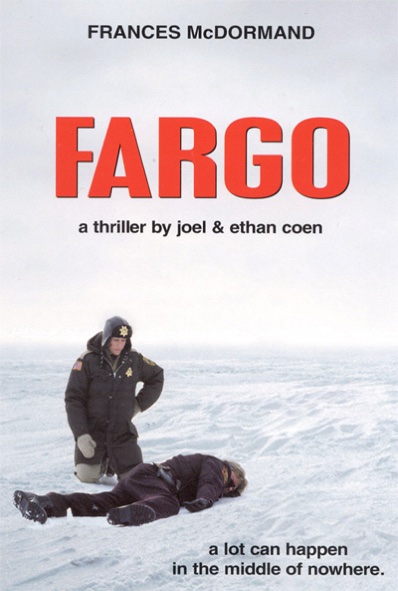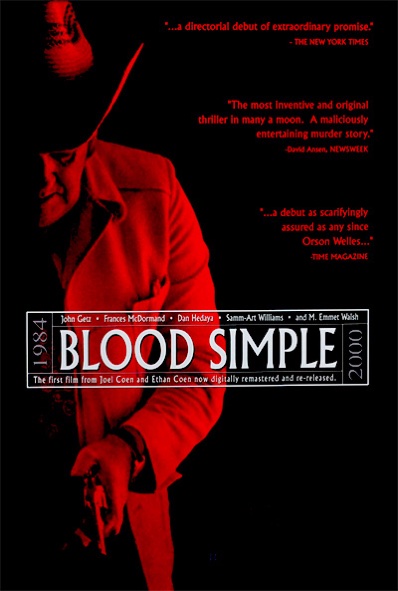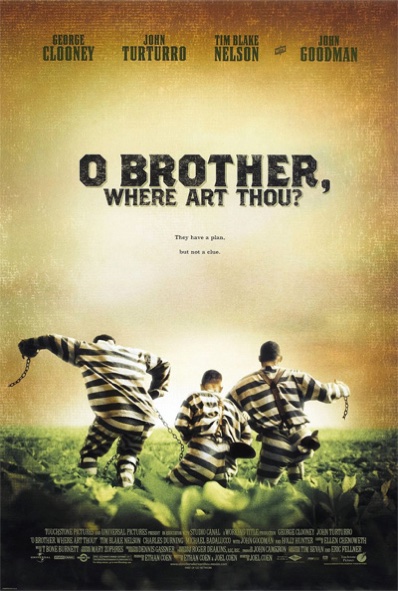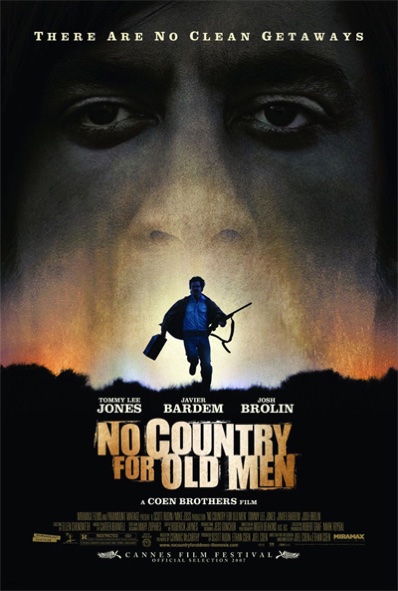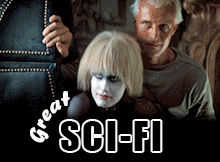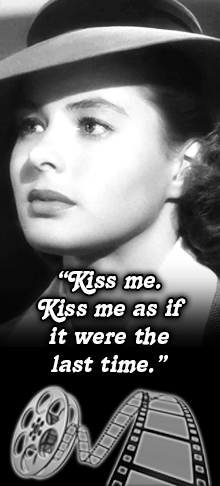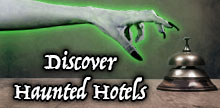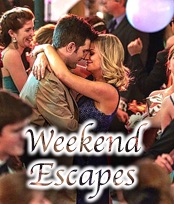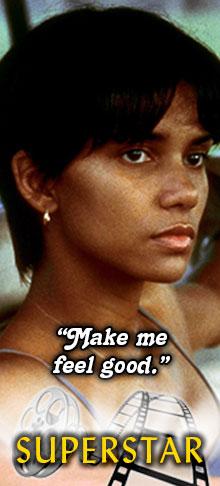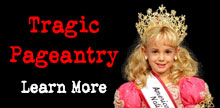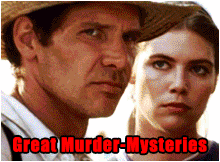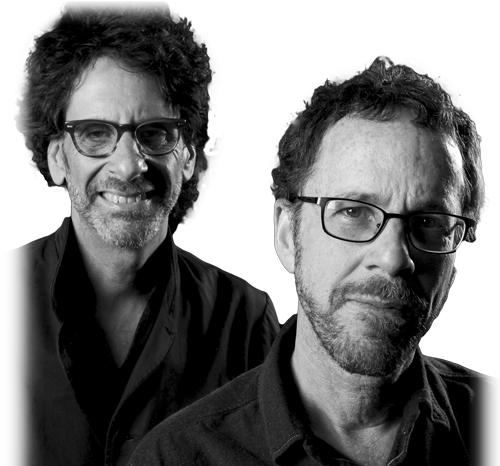
The Coen Brothers
Best known for the visual flair and eccentricity of their genre-busting films… they have made their distinctive mark in comedy, crime, drama, the Western, horror, thrillers, gangster, romance, adventure, and neo-noir cinema.
Joel and Ethan Coen, aka The Coen Brothers, bring their remarkable stylistic stamp to virtually everything they touch, across a variety of genres and even when they remain true to their adapted material. Its not just the insane violence, the strange arched dialogue, the ensemble of eccentric-looking characters, or the blackest, funniest black comedy in the business. It’s just that Coen touch, and it’s anything but light.
Though they originally listed Joel as the director and Ethan as the producer, the Bros write, direct, produce and edit (under the pseudonym Roderick Jaynes) as a unit. Their debut in 1984, “Blood Simple“, made a strongly stylish and bloody first impression with its hyper-violence, eccentricity, and characters that one would avoid at any cost. M. Emmet Walsh is a private eye hired by Dan Hedaya to kill Hedaya’s cheating wife and her lover. Typical of the Coens, the plot twists are numerous and ironic.
Their next film, “Raising Arizona“, couldn’t be more different. Small-time criminal Nicolas Cage and his wife, cop Holly Hunter, comically kidnap one of a wealthy mans quintuplets, figuring that it isn’t fair that one family would have so many and the unfertile Hunter couldn’t have any. The Coens have a lot of fun with dumb-as-dirt criminals. They supply the comic relief as well as the violence. Though John Goodman as an ex-con buddy baby sitter is plenty ominous, he weighs in on the funny side here.
The humor is more the ironic, smirking kind in the surreal, stylish “film noir” offering, “Barton Fink”, with John Turturro moaning about his writer’s block yet ignoring hotel neighbor John Goodman’s offering of stories aplenty. Possibly because of its uninviting name, “Hudsucker Proxy” was not as warmly received as previous Coen films. It’s a magnificent film, though, with lush art deco visuals and Coen-sane crazy humor wrought by interesting characters, including dim-witted hero Tim Robbins, Charles Durning and Paul Newman.
1996’s “Fargo” put the boys on the map for those who weren’t already Coen cardholders. Nominated for seven Oscars, it won for Best Screenplay and Best Actress (Frances McDormand, Joel’s wife), and is the paragon of the Coen style. Hilarious yet brutal, violent yet redemptive, endlessly interesting with insanely stupid criminals, a disarmingly perceptive detective (despite the Minnesota accent), shockingly quick plot twists, and precision-crafted dialogue, this is the Coen Brothers.
“The Big Lebowski”, featuring Jeff Bridges as the laid-back Venice, California, Dude, is the definition of a cult film. Though it didn’t do as well at the box office as other films, its advocates swear it is the Coens’ best, if not one of the best buddy movies ever. The Dude’s buddies include ex-surfer Steve Buscemi and John Goodman, again humorously ominous and vice versa, as a temperamental militarist and security-store owner. Though the film has been called “Chandleresque”, the twisting plot this time is really just an excuse to pour in even more crazy characters.
The Brothers’ playfulness is certainly not without an intellectual base. This comes to the forefront in the engaging “O Brother, Where Art Thou“, which brings a version of Homers Odyssey to Depression America. Showing off his over-the-top comic chops, George Clooney is an escaped con who brings his chain gang pals through a journey that includes lotus eaters, sirens, blind poets, a Greek chorus and John Goodman as Cyclops. Beautifully wrought, the film features an award-winning country-bluegrass sound track put together by T Bone Burnett.
The twenty-first century didn’t start out very well for the Coens. “The Man Who Wasn’t There” was just plain dull. “Intolerable Cruelty”, the first film that the Coens didn’t write, was a fun take on the screwball romantic comedy, with Clooney squared off against Catherine Zeta-Jones; it still left critics and audiences unfulfilled. That was followed by the remake of “The Ladykillers” that just left the audiences and critics wondering, What? Why?”
A few years off did the Coen Brothers good. Certainly nobody asked “What?” or “Why?” about “No Country for Old Men”, their most celebrated film. An amazingly faithful adaptation of Cormac McCarthy’s novel, it is actually the most unique of any of their films, sacrificing humor, a lot of their eccentricity and broadness, and so much dialogue that it is even more taciturn than the novel. They instead relied on mind-numbing violence and an assassin with an unusual weapon and a really bad haircut. The reward? Eight Oscar nominations and four wins, including Best Picture, Director and Screenplay, and an Oscar for the guy with the bad haircut, Javier Bardem.
“Burn After Reading” features Brad Pitt as a dim witted health-club worker who, with coworker Frances McDormand, tries to blackmail CIA agent John Malkovich. This whacked-out movie, so to speak, has all the aforementioned Coen characteristics, including an especially satisfying series of coincidences and plot twists.
With “True Grit”, the Academy again rewarded the Coens for departing from what they do best. Replacing John Wayne with an engorged and growling Jeff Bridges, the Coens did supply unusually wordy and arched dialogue, especially for newcomer Hailee Steinfeld, the tagalong vengeful teen. Though they received ten nominations, the Coens went home empty-handed.
Perhaps it says more about the film community than about the Coen Brothers, that most of their industry acclaim has been for “True Grit” and “No Country”. These are worthy films, to be sure, but they play it safe; they show little of what the Coens can really do when they set their minds to it.
— Nate Lee
Memorable Quotes by The Coen Brothers
Joel Coen:
Someone asked us once how we adapt novels, and Ethan said, “Joel holds the book open by the spine, while I retype it into the computer…Don’t change it [the book] if it’s not broken!
Joel Coen:
We’ve never considered our stuff either homage or spoof. Those are things other people call it, and it’s always puzzled me that they do.
Joel Coen:
The bigger stars we’ve worked with have been without the movie-star vanities or meshugaas that you read about and dread. George Clooney, for example, was the opposite. He has no entourage. He’s a big movie star, but a nice guy.
Ethan Coen:
We aren’t the grandfathers of any movement. In the 1980s, the so-called indie film movement was a media creation. What I found irritating is that ‘independent’ became an encomium. If it was independent, it was supposed to be good, and studio films were bad. Obviously, there are bad independent films and good studio films.
Ethan Coen:
The movie people let us play in the corner of the sandbox and leave us alone. We’re happy here.
Ethan Coen:
It’s easy to offend people. People get uncomfortable, for instance, when the main character in a movie is not sympathetic in a Hollywood formula way. Our movies are loaded with things that aren’t to everyone’s taste.
Things You May Not Know About The Coen Brothers
They work so closely with each other that the two of them have been jokingly referred to as “The Two-Headed Director”.
Have had final cut on all of their films since Blood Simple (1984), their debut film.
Frequently include kidnapping plots in their films.
Roderick Jaynes, who is credited with editing all of their films, does not, in fact, exist. The name is a pseudonym for the Coen Brothers.
In the late 60s, Joel and Ethan shot their own Super 8 version of “Advise and Consent.”
Both brothers are huge fans of Stanley Kubrick.
BEST SERIOUS FILMS:
- Fargo
- Blood Simple
- No Country for Old Men
BEST COMIC FILMS:
- O Brother, Where Art Thou?
- The Big Lebowski
- Hudsucker Proxy
- Raising Arizona
The Coen Brothers’s directing credits include…
| Year | Movie |
|---|---|
| 1984 | Blood Simple |
| 1987 | Raising Arizona |
| 1990 | Miller’s Crossing |
| 1991 | Barton Fink |
| 1994 | The Hudsucker Proxy |
| 1996 | Fargo |
| 1998 | The Big Lebowski |
| 2000 | O Brother, Where Art Thou? |
| 2001 | The Man Who Wasn’t There |
| 2003 | Intolerable Cruelty |
| 2004 | The Ladykillers |
| 2006 | Paris, je t’aime (Segment: “Tuileries”) |
| 2007 | chacun son cinéma (Segment: “World Cinema”) |
| 2007 | No Country for Old Men |
| 2008 | Burn After Reading |
| 2009 | A Serious Man |
| 2010 | True Grit |
| 2016 | Hail, Caesar! |






